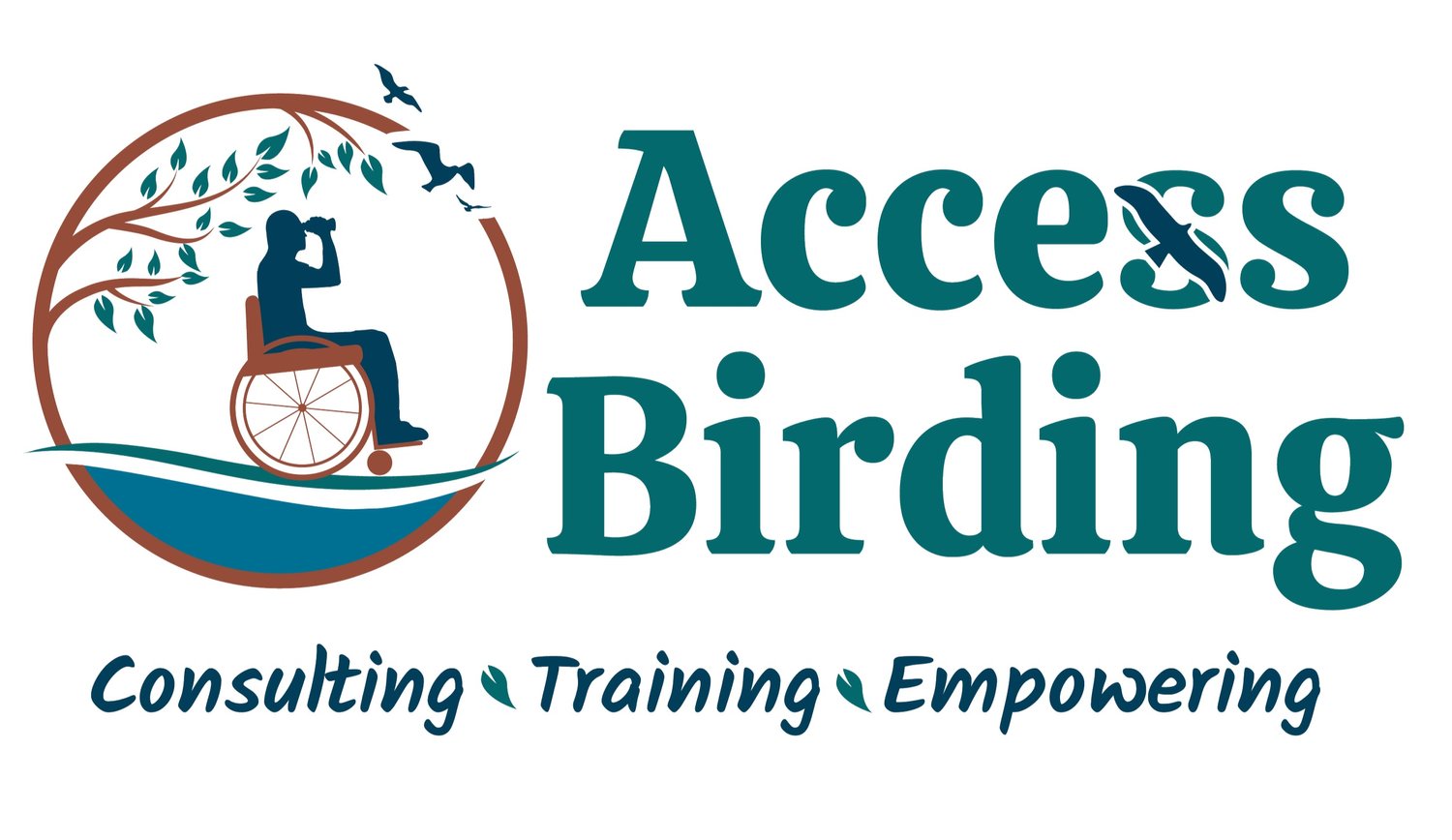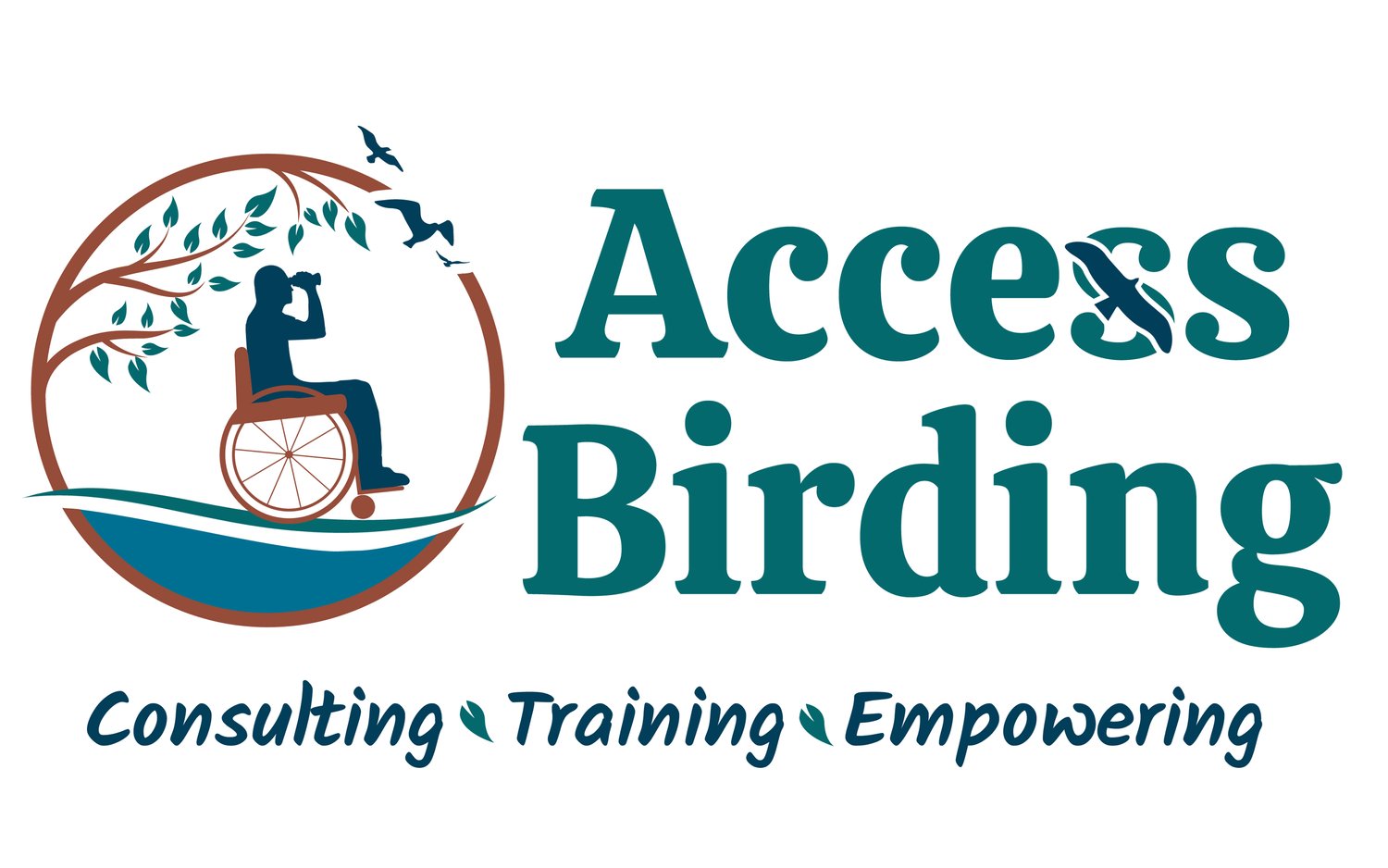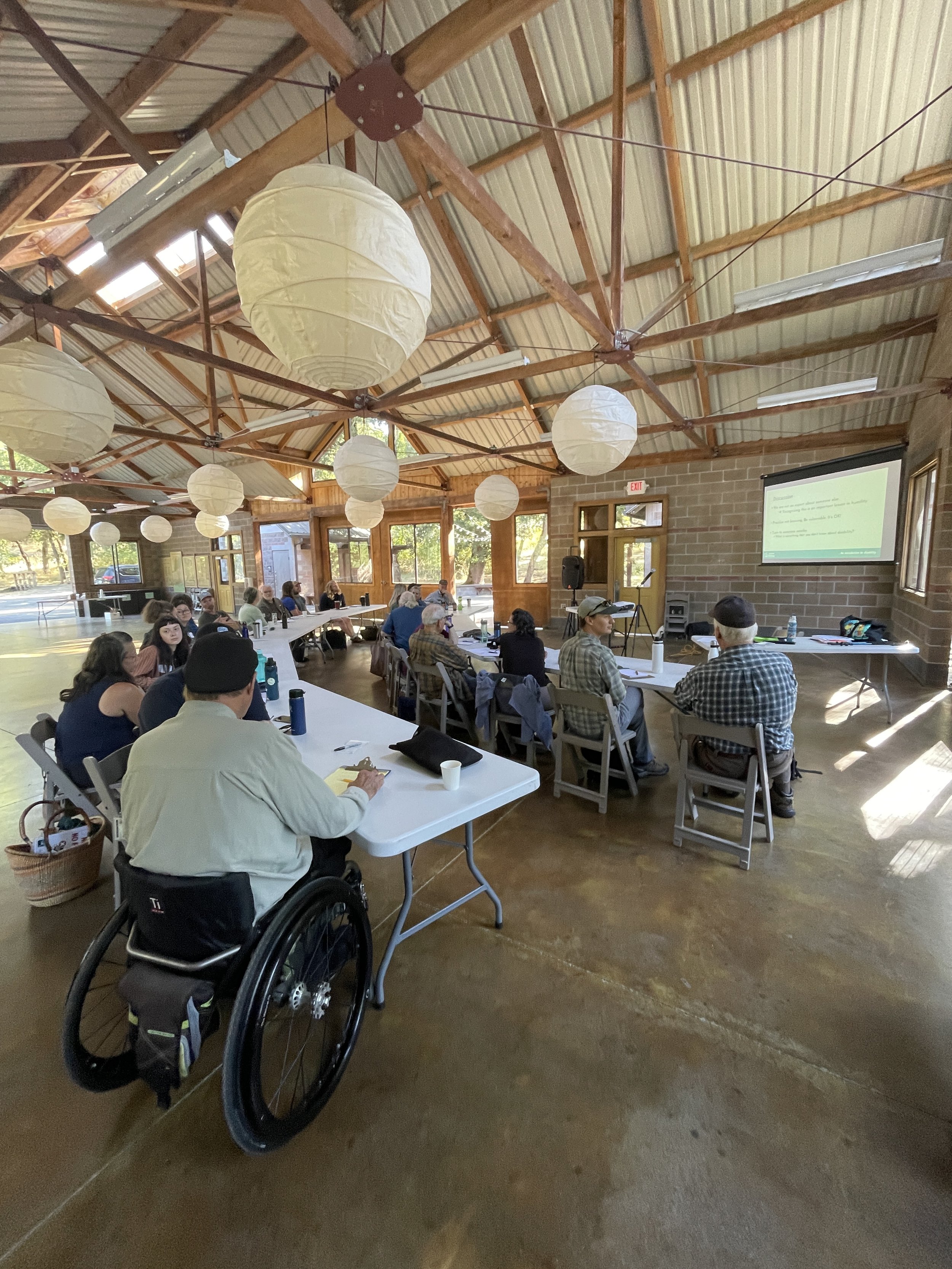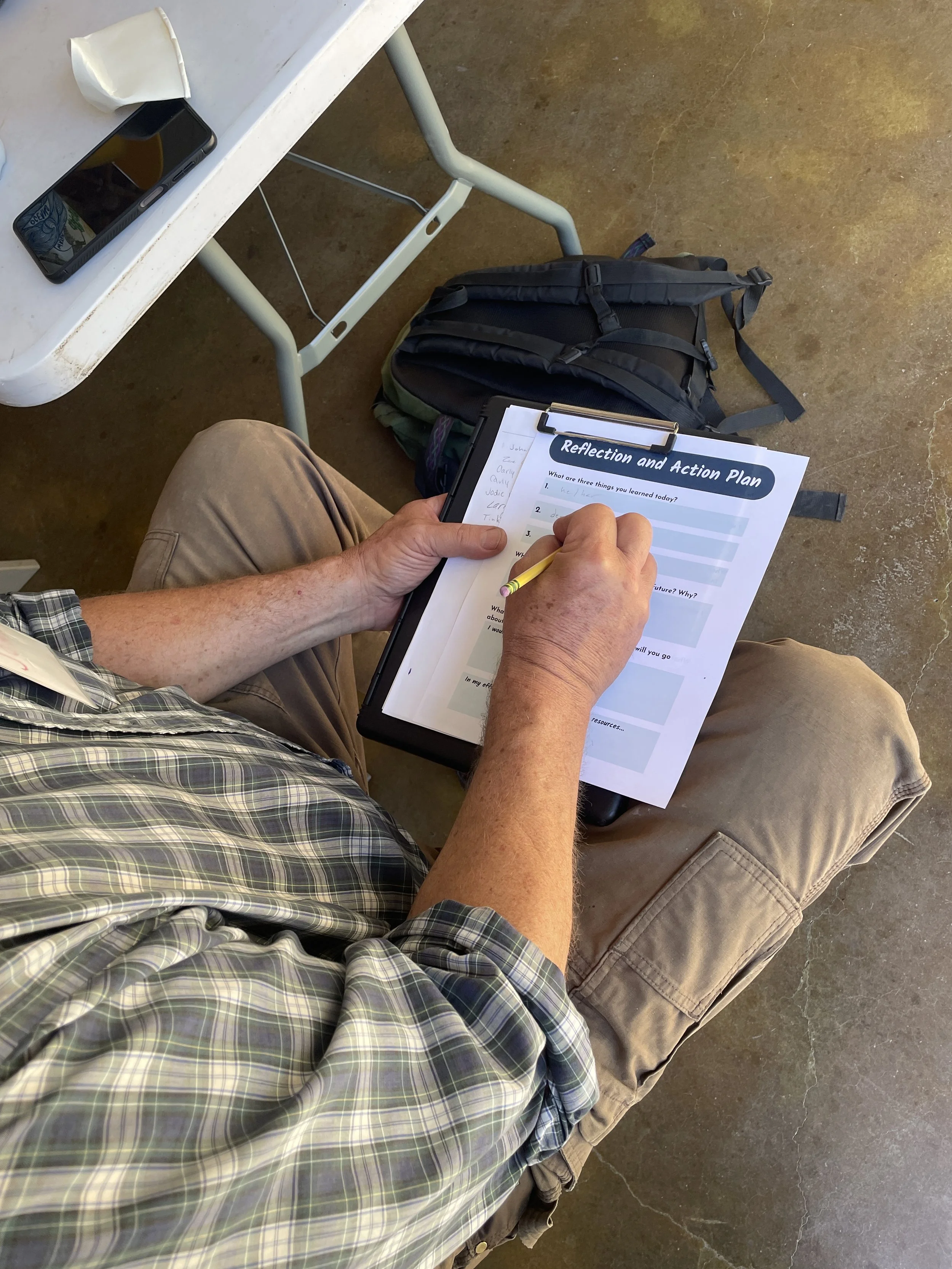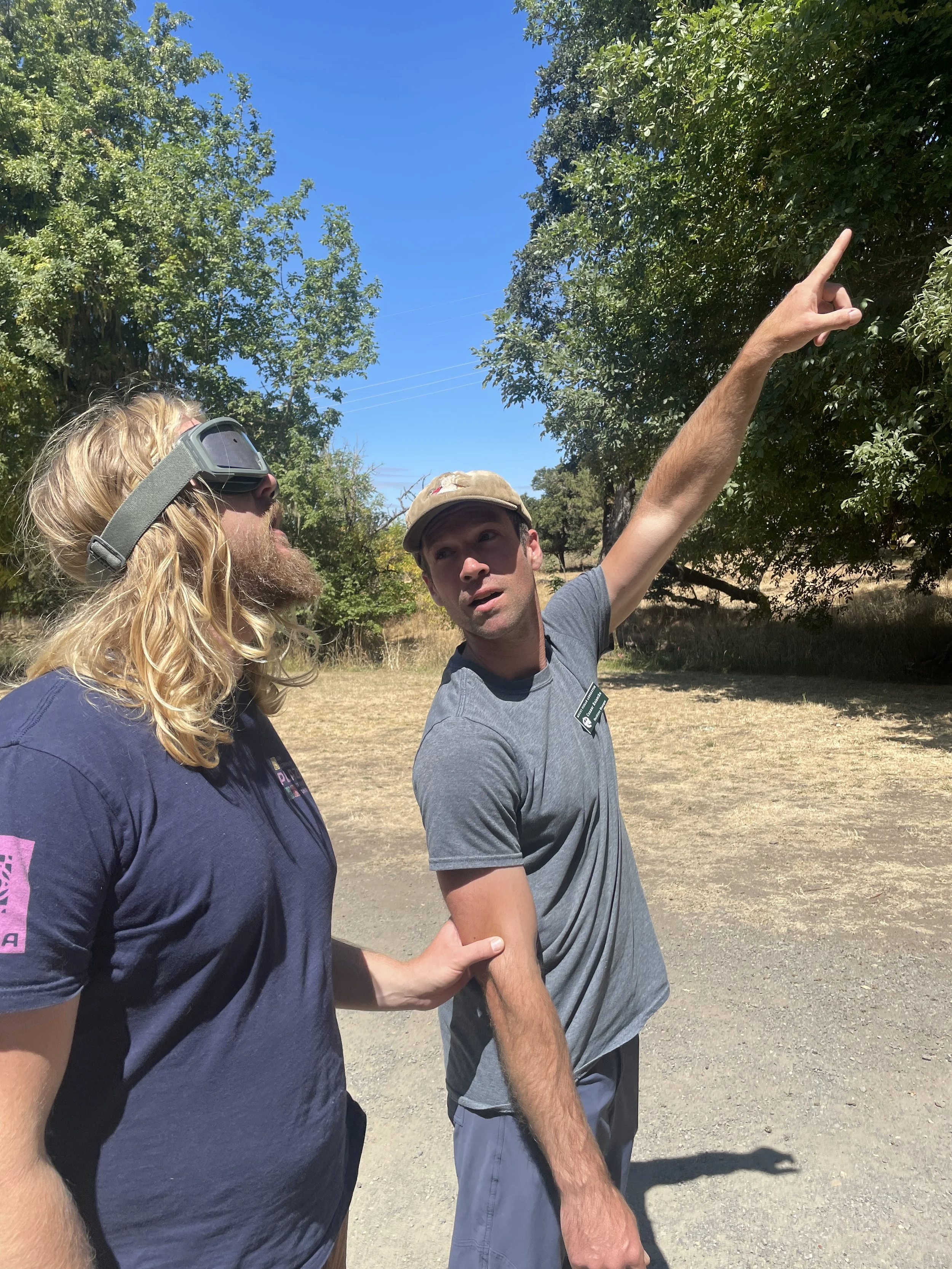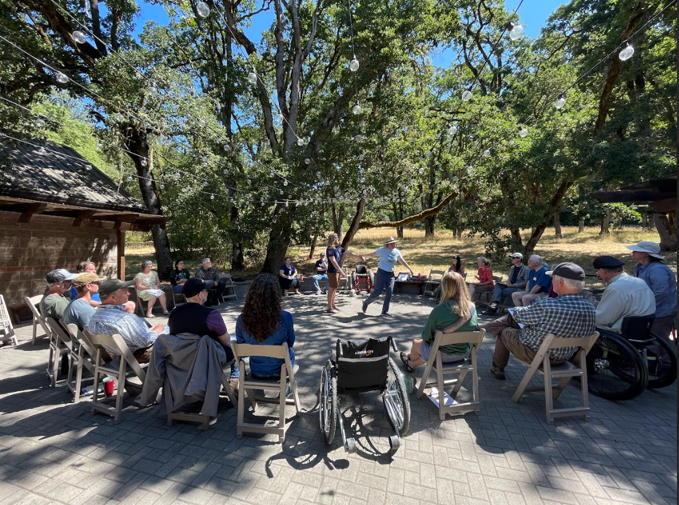
Workshops, training and
guest speaking
Empower your staff, volunteers and members to improve access and inclusion for disabled birders! Our workshops and trainings can be held online or in-person and work whether you have 300 staff or 15 volunteers. Choose from our options, below, or get in touch to collaborate on creating something just for your organization’s needs and interests.
Information about virtual 60-90 minute workshops.
Information about full day in-person workshops.
Jump straight to the workshop or training request form.
Find answers to frequently asked questions about Access Birding workshops.
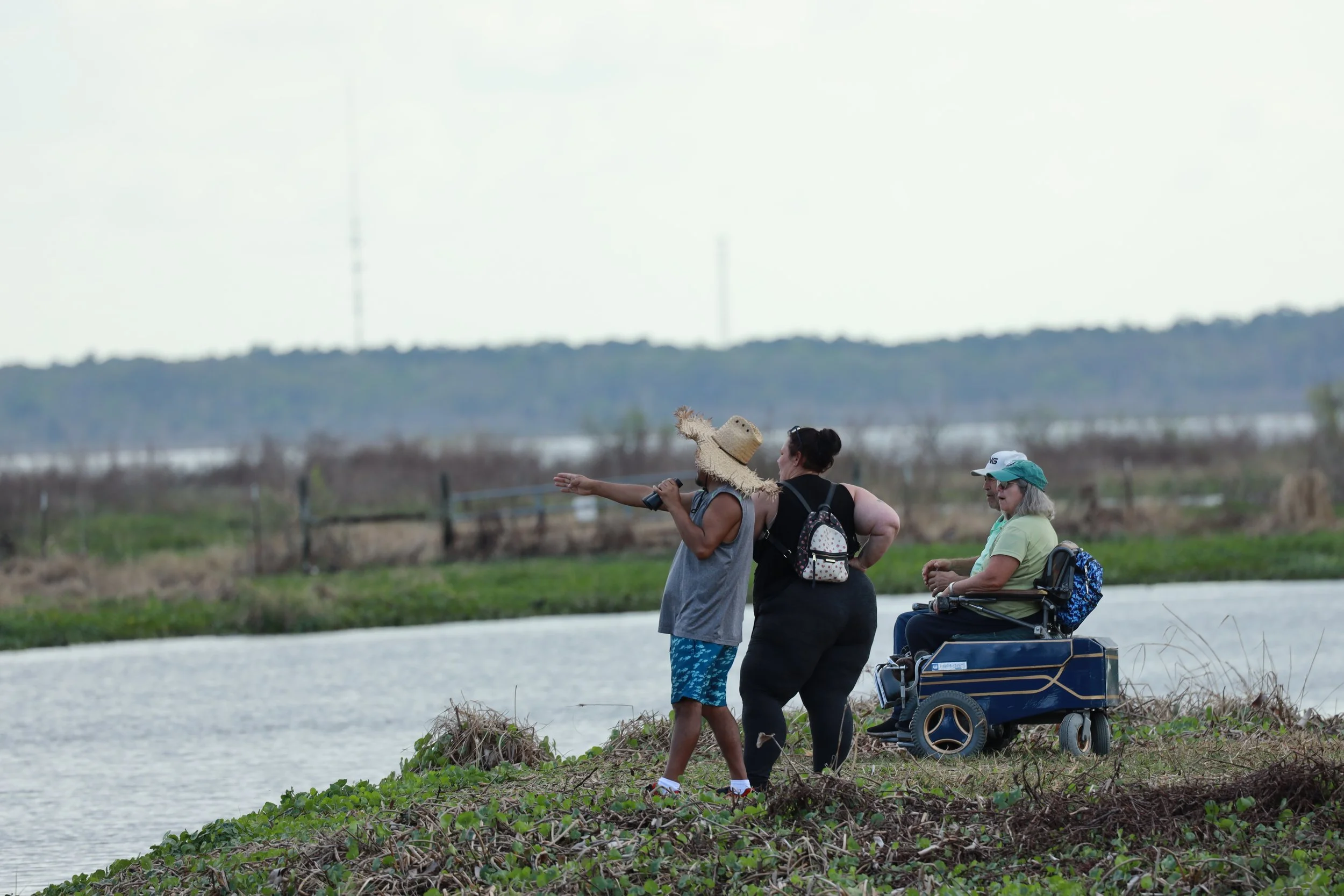
“Thank you! This has been the best overview of inclusion principles I've attended! I particularly appreciated Freya clearly spelling out issues and potential solutions in a firm, relatable and encouraging way - modeling the encouraged behavior.”
— Erin Goss, participant of ‘Facilitating inclusive bird outings’ workshop
Virtual 60-90 minute workshops
-
Easy ways to increase access and inclusion for disabled birders
Not sure where to start? This is the place! Learn basic disability etiquette, broaden your idea of what birding is, and learn practical, replicable strategies to make birding locations more accessible and bird-related programming more inclusive for disabled birders.
60 minutes, including Q&A .
-
Disability 101 for birders
Introduces would-be allies to the topic of disability and the disability community in the context of birding. Learn about best practices when it comes to the words we use, how to respectfully engage with disabled birders, and helpful strategies for birding with people who experience different access challenges.
60 minutes, including Q&A.
-
Introduction to disability and allyship
How can you best support and uplift disabled folks without getting in the way or risk being performative? Learn about the mindset needed to be an effective disability ally as an individual or as part of an organization. Includes an overview of disability language and etiquette.
60 minutes, including Q&A.
-
Facilitating inclusive bird outings
Creating welcoming and inclusive bird outings isn’t hard — but it must be intentional. Focusing on the social environment you create during your outings, learn easy strategies to help make other birders — disabled or nondisabled, beginners or experienced — feel glad they came along. Designed for outing leaders, interpreters and educators.
60 or 90 minutes, including Q&A.
-
Hosting accessible birding outings and opportunities
For interpreters, environmental educators and outing leaders at bird clubs, Audubon chapters and nature centers who want to host a variety of bird outings that are accessible for disabled birders. Learn about different kinds of accessible outings, what access features to look for when choosing locations, and how to write up the outing event description.
60 or 90 minutes, including Q&A.
-
Five easy steps to improve the accessibility of your interpretation materials
Maps, flyers, websites and social media posts: all wonderful interpretation materials… if you can access them! Learn easy ways to improve the accessibility of all of these items, and feel confident that your site and programs are reaching as many people as possible.
60 minutes, including Q&A.
-
Increasing accessibility for participants with sensory disabilities
Designed for educators and facilitators, this workshop dives into replicable strategies to ensure that participants who are blind or have low vision, and who are Deaf, deaf or hard of hearing can access what you’re trying to teach. Includes an overview of disability language and etiquette, sighted guiding, and receiving feedback.
60 minutes, including Q&A.
-
Birds as a therapeutic tool
There is a growing body of evidence to support nature-based therapy, for clinicians and for us all every day. But what about birds specifically? Can they be therapeutic too? Join occupational therapist and birder Freya McGregor for a dive into the research that encourages us to use birds and birding as a therapeutic tool — you may be surprised at what this hobby is doing for your overall health and wellbeing!
60 minutes, including Q&A.
-
Custom
Do you have something else in mind? Perhaps you’d like to go more in-depth, or cover another topic? Maybe you have a particular audience in mind, or would like more in-person activities? We can do that! Use the form below to get in touch, share a little more about your ideas, and let’s see what we can do.
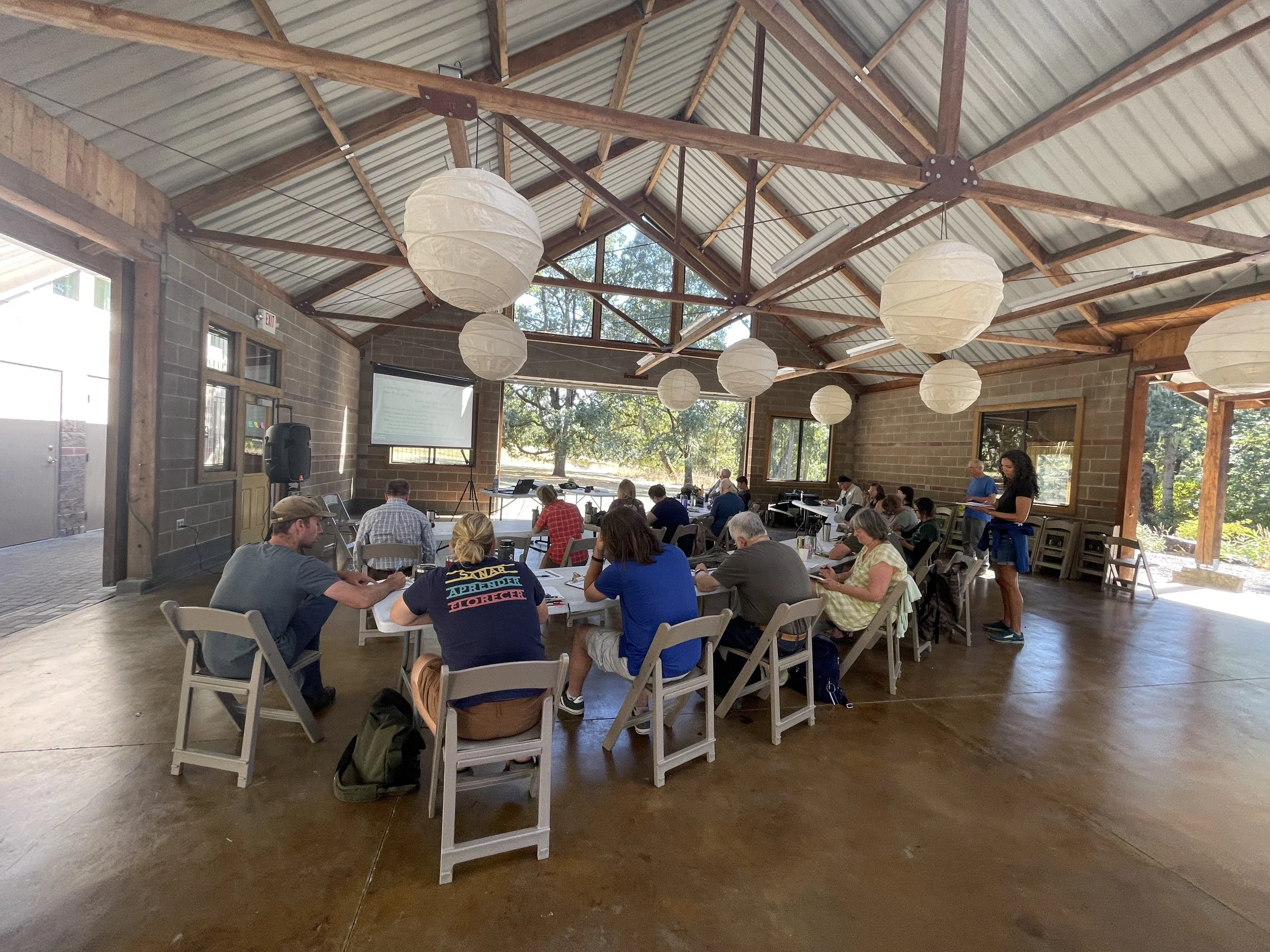
Our resourceful teacher had such energy and POSITIVITY! The lessons in language usage and how to communicate in an open, safe, informed, inclusive and friendly manner — and the confidence to do this without intentionally offending anyone — were very helpful. The use of wheelchairs and vision simulators made me think about things I previously would not have considered, leading to improvements for all trail users and perhaps better usage of our sites. The handouts were excellent. It was nice to hear a new voice with such great ideas!
— Participant at a full day Access Birding workshop hosted by McKenzie River Trust and Mt Pisgah Arboretum, Oregon.
Full day in-person workshops
There is a lot to cover to empower your staff, volunteers and members to feel confident taking effective action to improve access and inclusion for disabled birders. A full day Access Birding workshop is an interactive opportunity to learn more about disability, accessibility and inclusion in the context of birding and outdoor spaces, although many of the lessons can be applied to activities beyond birding. A full day allows time to cover many topics, put our learning into practice, connect with each other, and create a plan of action so that the information learned will actually be applied in the future. This is an opportunity for professional development, getting your team members on the same page, expanding your knowledge, and moving forward together in this important work.
Consider partnering with your local bird clubs, Audubon chapters, nature centers, land trusts, state parks, and other interested organizations to host a full day in-person Access Birding workshop. This creates an incredible opportunity to develop local partnerships with others invested in this work, and helps make sure the lessons learned during the workshop will be replicated throughout your community.
Photos from a recent full day in-person Access Birding workshop held by McKenzie River Trust and Mt Pisgah Arboretum in Eugene, Oregon. Photo in the top right by Brad van Appel; photo in the bottom center by Sarah Merkle; other photos by Freya McGregor.
Topics we will cover
A typical full day Access Birding workshop, lasting 8.5 hours including a one hour lunch break and two shorter breaks, will include:
An introduction to disability, including up-to-date guidance on best practices around language use and basic disability etiquette;
Hosting inclusive outings, including replicable strategies outing leaders, interpreters, educators and outing participants can use to help everyone feel welcome and included, no matter their access needs, expertise or comfort level, or other identities they hold;
Features of accessible birding and outdoor locations, and practice using a disability community-generated tool to gather the information relevant to share when describing a trail or event;
Sighted guide techniques, used by sighted people to most appropriately guide people who are blind or have low vision;
Anatomy of manual wheelchairs, and best practices assisting people who use wheelchairs;
Simulated experiences of having a visual or mobility disability, creating an opportunity to practice new knowledge and reflect upon some of the different ways people may experience access barriers and engage with birds;
Concrete strategies to make interpretation materials — such as signage, maps, flyers, and social media posts — accessible; and
Final reflection of the day’s learning and time to develop an action plan to make changes or improvements applying this knowledge.
If there are other topics you would like to have covered, or you would like to ensure we address one of these topics in great detail, we would be glad to customize this workshop to your organization’s needs. Please fill out the Workshop or training request form, below, let us know how what you’d like covered, and we’ll go from there!

This workshop was fun and stimulating the whole time. Freya's style of presentation is fantastic. So much energy and humor, speaking extemporaneously and "in the moment" yet very information-dense. She was very kind and supportive when eliciting input from the audience, and I appreciated her encouragement of advocacy. I will be promoting this workshop to all the organizations that I volunteer with.
— John F. Helmer, participant at a full day Access Birding workshop
hosted by McKenzie River Trust and Mt Pisgah Arboretum, Oregon.
Workshop or training request
-
Trainings and workshops are created and facilitated by Freya McGregor (she/her), OTR/L, CIG who is a disabled birder and an occupational therapist. Freya co-founded the nonprofit Birdability, and now works through her consulting and training business Access Birding to create a more welcoming, inclusive, safe and accessible birding community and the outdoors. She has a clinical background in blindness and low vision services, and her ‘dodgy’ knee creates an access challenge for her. Freya has written about access, inclusion, disability and birding for Audubon magazine, Birding magazine, and the LA Times, and works for the popular radio show and podcast ‘Talkin’ Birds’.
-
60 minute workshops are billed at $325.
90 minute workshops are billed at $450.
Customized and in-person workshop prices vary, depending on multiple factors including the number of participants and travel costs. A typical full day in-person workshop costs $6,550 + travel expenses, but this is just an estimate. Please get in touch using the form above and let’s discuss what you have in mind!
Once we have settled on a date for our workshop, we require a 50% deposit to confirm. An invoice will be emailed to you, and this can be paid using credit card via Stripe, or by ACH transfer. (Unfortunately we cannot accept checks in the mail, as too many of them have gone missing!) The final balance will be invoiced after the workshop.
-
We sure do! Please select ‘Customized workshop’ in the form above, and I’ll be in touch with you to see what we can create!
-
Unfortunately, we do request that recordings of our workshops are not made publicly available. I'm always torn about this because I want as many people as possible to learn more about access and inclusion for disabled birders! But facilitating workshops and providing consulting services is how I make my living, and if folks can watch recordings for free then they have no incentive to invite me to speak. Thank you for understanding this dilemma.
-
Some organizations who couldn’t afford the cost outright have included the costs in grants they have applied for, and others have partnered up with other local organizations to co-host the workshop and split the bill.
At this stage, unfortunately we do not offer free workshops, as we are just starting out as a small business, and facilitating workshops and providing consulting services is how I earn a living. I do provide free tips and strategies about access, inclusion, disability and birding via the Access Birding Instagram and Facebook pages, so feel free to follow and share or repost those! You can also have free tips and information delivered to your inbox by signing up, below, for the free downloadable ‘Five easy ways to improve access at nature preserves’. When free workshops will be offered, I will share about these through my e-newsletter!
